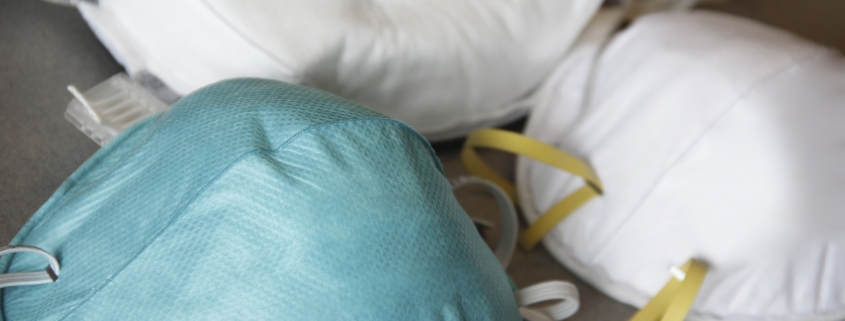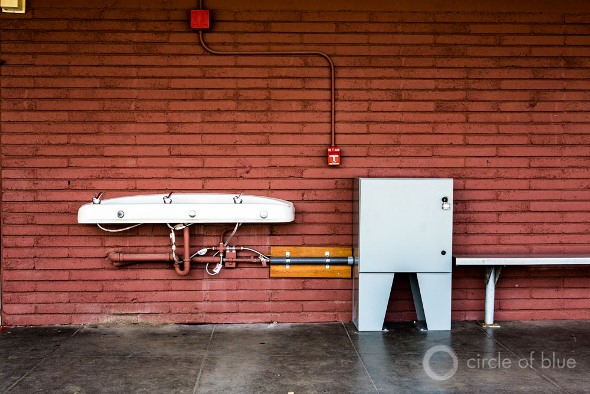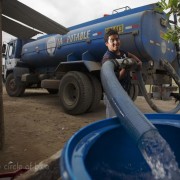Protective Gear in Low Supply for U.S. Water Utilities
Many utilities say their stocks will run out within a week or two.

Masks and other personal protective equipment are in high demand during the coronavirus pandemic.
By Brett Walton, Circle of Blue
Within the next two weeks, many U.S. water utilities will run out of protective gear that helps their workers reduce the spread of the new coronavirus.
Utilities are reporting in industry surveys that they are low primarily on the specialized N95 masks that block viruses and other tiny particles.
If the virus rampages throughout a utility’s work force the way it has in meat-processing facilities in Colorado, Iowa, and South Dakota, it could jeopardize the treatment and delivery of drinking water and the proper handling of sewage and stormwater. The potential for staff shortages is the biggest industry fear during the pandemic.
“Most utilities said they would probably be out of this stuff in the next week or two,” said Kevin Morley of the American Water Works Association, the trade group that is carrying out the assessments.
Supplies of other personal protective equipment, or PPE, such as gloves and hand sanitizer are less concerning right now but would still be welcomed, Morley told Circle of Blue.
As a stopgap measure, the Federal Emergency Management Agency is working to supply cloth masks to critical infrastructure sectors, a category of essential national functions that includes electric power, telecommunications, and transportation, as well as water and wastewater utilities. Cloth masks are a step below the protection provided by N95 masks.
The FEMA plan is faint in detail and coming together in a rush, according to Morley, who is the federal relations manager at AWWA.
“FEMA is not giving a lot of intel,” Morley said. On Friday, April 17, the agency requested names and addresses of utilities in need, he said. The turnaround time for providing the information was about four hours.
The first shipments of masks to utilities were supposed to be out the door by now, but Morley said that as of Tuesday morning they have been delayed.
“My sense is that demand is overwhelming FEMA’s ability to process orders,” he said. FEMA’s communications office did not respond to a request for comment.
Scramble for PPE
Across the country, the same forces of extraordinarily high demand and insufficient supply that have bedeviled the healthcare industry’s access to PPE are also obstructing water utilities. City and state officials have reported extraordinary efforts to secure PPE. The governor of Illinois, J.B. Pritzker, organized a charter flight out of China for supplies that the state ordered, according to the Chicago Sun-Times. The secrecy was to prevent the U.S. government from seizing the shipment. In Massachusetts, a hospital executive wrote in the New England Journal of Medicine about “bizarre and convoluted deals” for PPE only to be outbid by the federal government.
Because of high demand, increased use at work, and competition in the market, U.S. water utilities are seeing their PPE stockpiles diminish.
“Our members are reporting to us that PPE is hard to get, and it is hard to replenish supplies,” Michael Arceneaux, chief operating officer of the Association of Metropolitan Water Agencies, told Circle of Blue. AMWA represents large water utilities.
These anecdotal references have been tracked in a series of utility surveys from the American Water Works Association.
Fifty-nine percent of the more than 500 utilities that responded to AWWA’s second survey, which was carried out in the last week of March, said their PPE supplies are either currently disrupted or they expect a disruption in the next month. In the first survey, only 33 percent of utilities anticipated PPE supply constraints. AWWA is now working on a third poll.
Following up on the second survey, Morley asked utilities specific questions about PPE. Experiences vary — there are 50,000 public drinking water systems and 16,000 wastewater utilities in the country, serving dozens of customers up to millions — but in general there is growing concern about the availability of PPE.
Morley said that PPE was crucial for water utilities so that employees — who are deemed essential workers by the federal government — do not get each other sick.
Utilities do not have the same risk factors as slaughterhouses, where hundreds of workers at single facilities have tested positive for the virus. Utility employees generally do not work in crowded, confined spaces. Still, utilities are taking steps to reduce their exposure.
Des Moines Water Works is sequestering treatment plant operators on site and moving to 12-hour shifts. Employees at other utilities are being allowed to take work cars home to minimize interactions and vehicle sanitizing. Some utilities have closed customer service offices and stopped in-person visits to homes and businesses.
“Any protection you can provide is a way to manage and sustain the work force,” Morley said.
Even with those measures, utilities want protective equipment for their workers as an additional defense. N95 masks and surgical masks are supposed to be used a single time and then discarded. But with supplies low, utilities could encourage mask reuse, or resort to makeshift options such as bandannas. Masks protect workers not only from person-to-person transmission, but also from pathogens in raw sewage that could be churned into aerosolized droplets during the treatment process.
The FEMA program, coordinated through the U.S. Environmental Protection Agency, is meant to fill the gap, but it is too soon to tell how effective it will be. Morley said there are questions about FEMA’s capacity to fill orders to meet projected needs, how the supplies would be distributed, and who would be first in line to receive them. The situation is fluid, he concluded.
“I might have a totally different conversation with you in two to three days,” Morley said.
Brett writes about agriculture, energy, infrastructure, and the politics and economics of water in the United States. He also writes the Federal Water Tap, Circle of Blue’s weekly digest of U.S. government water news. He is the winner of two Society of Environmental Journalists reporting awards, one of the top honors in American environmental journalism: first place for explanatory reporting for a series on septic system pollution in the United States(2016) and third place for beat reporting in a small market (2014). He received the Sierra Club’s Distinguished Service Award in 2018. Brett lives in Seattle, where he hikes the mountains and bakes pies. Contact Brett Walton












Leave a Reply
Want to join the discussion?Feel free to contribute!